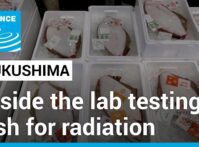-
Can Citizen Science Help Small Communities Combat Big Fishing Fleets?
April 20, 2016 By Meaghan ParkerThis Earth Day weekend, the U.S. Department of State is hosting more than 2,000 coders in more than 40 cities to encourage creative thinking about technological solutions to ocean issues. The third annual Fishackathon could produce new tools for local communities to track long-distance fishing, a growing problem in some places, as China, in particular, scales up its efforts.
“The Chinese are catching 12 times the amount of fish they report,” says Jennifer Turner, director of the Wilson Center’s China Environment Forum, which produced a report on distant-water fishing in 2013. “The U.S. has 200 ships; the Chinese have a little over 2,000,” she tells Wilson Center NOW.
“They used to fish along China’s coast. But because of overfishing and also a lot of pollution…30 to 50 percent of their fish stocks have crashed, so their fishing fleets go further afield,” Turner says. Frequently, these fleets end up off the coasts of poor countries in Africa and Asia that don’t have capable policing to chase them off.
Local coastal communities in these places – many of whom depend on fish as their major source of protein – are paying the price, says Roger-Mark De Souza, director of population, environmental security, and resilience at the Wilson Center. Harmful fishing practices, such as trawling, dynamiting reefs, and using cyanide, have “long-term impacts on the ecosystem that affect their livelihood opportunities,” he says.
Sparse data on fishing practices and lack of transparency about the data that does exist are impediments to tracking the impact of illegal long-distance fishing and stopping it. De Souza said engagement with affected communities in decision-making and data collection can be valuable, as “communities are themselves developing local enforcement mechanisms.”
Citizen science projects, like those cultivated by Fishackathon and events like it, could provide “an opportunity for these communities to be part of the process,” says De Souza. “We need to engage various mechanisms to collect data that will allow us to have a better sense of what’s happening now.”
“It’s quite exciting,” says Turner. “This kind of event can give them voice.”
Sources: U.S. Department of State.
Video Credit: Wilson Center NOW.
 A Publication of the Stimson Center.
A Publication of the Stimson Center.






